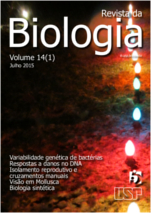Analysis of genetic variability by RAPD of strains isolated from soil and sludge impacted with industrial effluent
DOI:
https://doi.org/10.7594/revbio.14.01.01Keywords:
Sludge and soil bacterial community, polycyclic aromatic hydrocarbons, RAPDAbstract
The RAPD (Random Amplified Polymorphic DNA) is an ease and inexpensive tool to analyze microorganism in the environment. However, the protocol optimization is a crucial step to provide a suitable polymorphic profile. In the present work, bacteria obtained from activated sludge system and soil impacted with industrial effluent were studied by RAPD technique to provide genetic similarities relationships. A similarity level of 91.9% to 56%, between isolated sludge and soil were observed. A genetic starter was selected after protocol optimization and a characteristic polymorphic bands profile generated to isolated microorganisms. The presence or absence of the isolated microorganisms in samples can be controlled by using the obtained polymorphic profile.Downloads
Downloads
Published
2018-04-23
Issue
Section
Artigo
License
We ensure that our journal does not retain any copyright and that these are exclusive of the author(s) of the text. In that sense, we intend to break any restrictions to the published material and to achieve more intensely our goal of communicating science.
How to Cite
Silva, R. G. da, Pinhati, F. R., & Silva, J. T. (2018). Analysis of genetic variability by RAPD of strains isolated from soil and sludge impacted with industrial effluent. Revista Da Biologia, 14(1), 1-5. https://doi.org/10.7594/revbio.14.01.01






